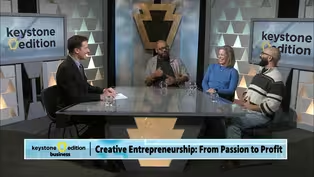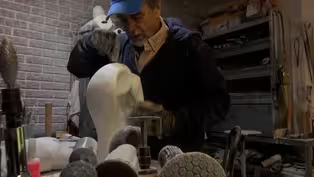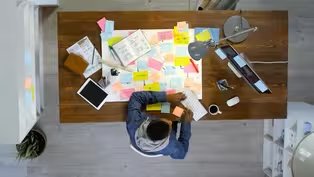Keystone Edition
Balancing Creativity and Business: The Artist’s Journey
Clip: 2/10/2025 | 10m 4sVideo has Closed Captions
Artists discuss balancing creativity, entrepreneurship, and financial stability in their lives.
How do creative professionals balance their passion with financial stability? Keystone Edition Arts explores this question with panelists Dan Kimbrough, Dr. Emily Martin, and Pedro Reyes. From transitioning from artist to entrepreneur, to juggling multiple careers, they share insights on sustaining a creative life while managing real-world responsibilities.
Problems playing video? | Closed Captioning Feedback
Problems playing video? | Closed Captioning Feedback
Keystone Edition is a local public television program presented by WVIA
Keystone Edition
Balancing Creativity and Business: The Artist’s Journey
Clip: 2/10/2025 | 10m 4sVideo has Closed Captions
How do creative professionals balance their passion with financial stability? Keystone Edition Arts explores this question with panelists Dan Kimbrough, Dr. Emily Martin, and Pedro Reyes. From transitioning from artist to entrepreneur, to juggling multiple careers, they share insights on sustaining a creative life while managing real-world responsibilities.
Problems playing video? | Closed Captioning Feedback
How to Watch Keystone Edition
Keystone Edition is available to stream on pbs.org and the free PBS App, available on iPhone, Apple TV, Android TV, Android smartphones, Amazon Fire TV, Amazon Fire Tablet, Roku, Samsung Smart TV, and Vizio.
Providing Support for PBS.org
Learn Moreabout PBS online sponsorship- I'd like to introduce our panelists here to share their perspectives.
Dan Kimbro is the CEO of Park multimedia based in Wilkesboro.
Dr. Emily Martin is a trained opera singer who also teaches vocal performance at Bucknell University, and Pedro Reyes is a visual artist and muralist from Sunbury.
If you have any questions, please ask at keystone@WVIA.org.
Pedro, Emily.
Dan, I'm looking forward to this conversation.
I've really enjoyed learning about each of your creative work, your creative processes, and sharing with our viewers how you go about balancing that with profession and with business.
Emily, I'd like to start with you.
In your career, you've been a professional performing artist and opera singer, and more recently, as an entrepreneur, you advise creative professionals.
- Yep.
- Can you walk us through what it was like taking those first steps from artist to business and entrepreneur?
- Sure so I started the business actually during Covid with a colleague of mine because we had a lot of opera singers and musicians saying, what do I do next?
They weren't getting the education in school.
And so as I had had so much experience through my singing, I thought, oh, this is the perfect opportunity.
And we started with things like CVs resumes, those kinds of things.
But then we realized that they actually needed to learn more project development skills.
So I was new to it as well.
So I had been doing my own projects and I had to really learn, you know, how to do a budget for the business, how to do marketing, social media was a huge thing, how to sell myself rather than just my professional singing career.
So yeah, it was quite a leap.
Luckily during Covid, I had a little bit of time while I was at home to think about it, but it's ever evolving.
- I've often talked with, well, colleagues of yours among the faculty at Bucknell University, some of them early in their career, say, the first time you really, really learn something is when you have to teach it.
- Yes.
- So were there parallels with teaching someone advising coaching entrepreneurs as you yourself, were learning to grow your own business?
- Yeah, I mean, I, it's, I always say with teaching, it's like staying one step ahead.
It's like the best way to do it.
So I, a lot of times would feel like I was one step ahead, but I was really, it was always like, somebody would say to me, I wanna write a grant.
And I would say, oh, I've only written like one grant, so I've gotta figure out how to write grants.
And then now I do a lot of grant writing.
So yeah, it's a constant, me teaching myself, me educating myself, and actually my clients educating me in a lot of ways.
- Pedro, I'd like to hear about your journey as an artist.
And I know I've heard you say you want to do something in life working that is, that you never retire from.
- Yes.
- Tell, tell us about that.
- So that started because after 10 years of being a certified Nurse's assistant, my biggest takeaway in moving onto a different career was the fact that we tend to live very long.
You know, it's always the individuals who think they should have been gone a long time ago, you know, well earlier in their, into their life, they just managed to stay around for the a hundred years.
(all laughing) And so my takeaway was I was seeing everyone around me around that 65 to 67 age, just kind of retiring and then not knowing what to do with themselves because they had been working 40, 50 years in something.
And then just, what do you do when bills are paid and, and everything's okay now, it's just up to you to make the decision.
And so I was lucky that I had artistic talents.
And so I went back to school shortly for graphic design, learned all the ins outs of, of, you know, composition and design principles, and just ran with it.
My goal is to do it, you know, up until hours before I'm moving on, so to speak.
Picasso did it, you know, and when I look at the comparison, I know we're not supposed to compare, but nowadays it's really, it's really fun to just put yourself in someone else's shoes.
And with as nice as we have it nowadays, why wouldn't you do it?
So I play with this idea that, you know, he had 50,000, I'd love 50,000, even though- - Creating a piece of art.
- Yes even though he did start 20 years before.
- You can do it.
- Yeah, I don't have to mix my own paints, so I'm already up.
(group laughing) - Little bit of a headstart there.
What draws you to your particular form of creative expression?
We've been seeing some of your paintings.
Some of your murals.
- Yeah.
Honestly, being able to, to physically put some sort of visual representation of the, the moment that I'm sort of being commissioned to do, or, or that I'm just working on, you know, the Eagles are going to the Super Bowl.
I was so busy with work that I did not realize that the Eagles were going to the Super Bowl.
And so it's midnight, I'm painting, like I normally am just madness.
And I hear it on a commercial, and they're like, this, you know, Super Bowl Chiefs and Eagles.
And I was like, oh my goodness.
And I'm also a barber and cosmetologist.
And so for me it was like, I've cut the barber, you know, I've cut the Eagle's logo into people's hairs like seven, eight times.
It was like, well, how do I get this word out now?
It was like, paint another picture.
You know?
And so it was, you know, a portrait with a child and the Eagle's logo on his head and, you know, post at the following day.
And now, you know, we're doing Eagle's logos.
So it's a bit of a communication thing to just kind of like, hey, there's a train going by and it's going in this direction.
You know, you should jump on it or, or just let it be.
- Dan, we heard Pedro talk about okay, he also has another profession, other professional skills.
And I know that sometimes balances the finances so that you can create.
Can you talk about that, the balance between creating and needing to pay the bills?
- It's a hard one, and that's, I luck out that I work in a visual medium as well, where I can do videography or photography or a lot of those different things.
And so it's easier to sort of be able to do things financially.
But it's a balance sometimes because the more time that I'm out in the field shooting or working on something, the bills aren't always getting paid because I'm shooting in that moment.
And so, like, that's not paying the bills til after to get the project done.
And so if you've got a week where you've got multiple projects going, it's great 'cause you're out and you're working, you're doing all those things.
But at some point you have to sit down and figure out paying the bills and running all the reports and doing all those things.
And so you have to figure out how to balance it.
You said you were up at midnight painting and, you know, it's one of those things that the creative aspect of it doesn't always happen during the nine to five, because a lot of businesses are running nine to five.
And so I may be doing phone calls and meetings and, and consultations with clients during the day.
And at six o'clock after dinner, now it's time to sit down and start editing or creating or doing all the other things.
And so it's just time management and balancing it all.
- What were some of the things that drew you to being a creative professional?
How did you know that that was the path?
- I don't know.
I don't remember a time where I didn't create things.
And so it was just one of those, I've always had a hand in doing creative things.
I remember even in high school, we had an African American sort of fraternity and sorority.
It wasn't a real one, but for high school.
And we used to do a step show and like I remember I would design the tickets every year, or I would design the poster and the little things.
And it wasn't anything that I ever wanted to do long term.
I just always found myself creating.
And then when I got into college, the goal was to be a psychologist and do other things.
And I hurt myself playing football.
And one day there was a call out at the radio station and they needed an announcer.
And I was like, man, I know football.
And that was where I ended up in radio and video.
And it sort of went from there, but it was never a plan.
I just was always doing it.
- Wow.
- I just wanted to make a comment about the idea of finishing the project.
Something I think a lot of people might not understand is it being a creative entrepreneur, you have to finish the project before you get paid.
So quite often, like say, I'm gonna do an opera gig, I am somewhere for four weeks before I get the, the first check on opening night.
Right.
So I have to figure out financially how to actually do that four weeks.
- And it's interesting that for a while that was my model and I had to switch it because I used to work in weddings as well.
And it was one of those, you do the wedding and it was like, all right, the wedding is done.
I have to edit everything, and I'm still waiting to get paid.
And I'm was like, I can't do that anymore.
So like, I had to go to deposit method where I had to get paid ahead of time, something to be able to pay the bills and afford gas to get to the wedding.
That's three hours away.
And so, yeah, it's the balance of, I know I've gotta get the product done, and I need that carrot of waiting to get the full pay.
But being able to survive the in-between as well.
And how do you sort of advance yourself.
- Yes, important.
- I was gonna say yes, (group laughing) which is why I barber, I'm also a cosmetologist, which is the craziest thing.
But it's the idea that you wanna do this thing, but you have to still oblige by the normal society rules.
Pay your bills, you know, make sure you have a roof over your head.
Make sure your kids are eating and so you do what you can and taking care of your responsibilities first.
And then you have that fever at night or early morning where you could continue keeping that dream alive.
And I think the long-term aspect of knowing like, all right, you're only failing if you decide to quit.
You know, this is the name of the game.
It's ups and downs, but you only, you know, lose if you give up.
- Are there times, and this might be for any of you,
Creative Discipline: Finding Balance in Art and Business
Video has Closed Captions
Clip: 2/10/2025 | 14m 19s | Artists discuss maintaining creativity while managing business, mentorship, and the value of failure (14m 19s)
Creative Entrepreneurship - Preview
Clip: 2/10/2025 | 30s | Watch Monday, February 10th at 7pm on WVIA TV (30s)
Overview: Turning Passion into a Business
Clip: 2/10/2025 | 1m 16s | Exploring how artists and creatives balance artistry with business through entrepreneurship. (1m 16s)
Providing Support for PBS.org
Learn Moreabout PBS online sponsorship
- News and Public Affairs

Top journalists deliver compelling original analysis of the hour's headlines.

- News and Public Affairs

FRONTLINE is investigative journalism that questions, explains and changes our world.












Support for PBS provided by:
Keystone Edition is a local public television program presented by WVIA


